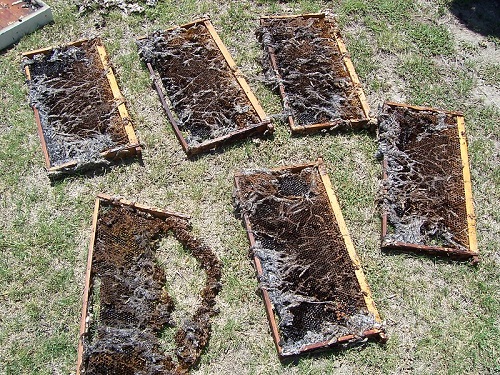EPA Introduces New Pesticide to Prevent Wax Moths from Damaging Honeycombs
January 13, 2020
Great news for beekeepers battling problems with the wax moth. Read more...
Over the last few years, we have had a lot of ups and downs with the EPA, but the latest news appears to be a turn for the better. Wax moths are one of the many problems hives face that has killed off a considerable about of honey bees, but the EPA is now set to approve a new pesticide that will help our beekeepers protect their hives by targeting this specific insect.
The Wax Moth
This insect does not get the attention of the Varroa mite, but it can be just as dangerous to hives. Adult females work their way into hives during the evening hours and place their eggs into every crack and crevice they can find in the hive. The larvae then proceed to burrow into the honeycombs throughout the hive to feed on everything from the honey to the wax to the pollen and yes, the larval honey bees. For beekeepers, this could be a true gamechanger, as the damage done by this moth, as you can see in our picture, is pretty significant.
The new pesticide will contain Bacillus thuringiensis. The active ingredient in the pesticide, which is part of the Bacillus thuringiensis family, is called Bta ABTS 1857. This ingredient is believed to produce a crystallized protein that is considered to be toxic to this particular breed of moth. We are now officially in the season for beekeepers to use this product. For it to be most effective, beekeepers should be spraying down their empty honeycombs prior to placing them in storage. As the moths attempt to feed on the honeycombs, they will also be ingesting the pesticide, which will eventually cause the stomach of the moth larvae to rupture. According to the EPA, it expects “minimal to no exposure to honey bees and other nontarget organisms because of the method and timing of the application.”
If this pesticide is as good as the bill of sale, it should dramatically help beekeepers maintain their hives over the winter months. We simply cannot afford to have another winter throughout the industry like we did last year. In far too many cases, beekeepers were reporting at least 40 percent losses, with many hives being completely wiped out. Honey production is way down throughout the world, so this winter will obviously be a key to getting the industry back on track again.
Source: Genetic Literacy Project, Photo Courtesy of Tobin via Creative Commons License


.jpg)



